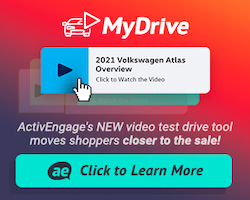California lays it out for dealers and TrueCar.
This is one of the more detailed Executive Summaries I have read…
CONCLUSION
In the State of California, TrueCar is viewed as an autobroker and vehicles displayed and offered for sale on TrueCar websites are advertisements to the public and must comply with California law.
According California to it appears that many facets of the TrueCar/Zag broker program fail to comply with California law and such non-compliance could expose both TrueCar and participating new motor vehicle dealers to legal liability and/or license action.
Enjoy…

In response to a large number of inquiries received from California dealer members, we requested outside legal counsel, Manning Leaver, Bruder & Berberich (who also authors the California Auto Dealer Advertising Law Manual), to research the occupational license status of TrueCar, Zag.com, Inc. and affiliates and opine on a variety of DMV licensing and advertising issues associated with the TrueCar program. Attached (after the jump) please find a copy of an Executive Summary of a Memorandum prepared by outside counsel.
The Executive Summary identifies a number of problems with the TrueCar model that could expose participating dealers to legal and/or licensing liability. Dealers that participate in the TrueCar program, or other similar programs, should individually review such programs with your own legal counsel for legal compliance.
Read the full Executive Summary after the jump…
Executive Summary of TrueCar Memorandum
Executive Summary of our memorandum to the California New Car Dealers Association in response to the Association’s request that we (1) review the occupational license status of TrueCar, Inc., and affiliates, Zag.com, Inc., Zag Automotive, LLC and Drive Your Dream (hereinafter collectively referred to as “TrueCar”); and (2) comment on potential occupational licensing and/or advertising issues associated with TrueCar’s brokering program and its websites. This memo is not intended, nor should it be received, as legal advice or a substitute for legal advice to California vehicle dealers. Dealers should consult with their own legal counsel for legal advice that may pertain to their situation.
CONCLUSION
TrueCar is an autobroker and vehicles displayed and offered for sale on TrueCar websites are advertisements to the public and must comply with California law. It appears that many facets of the TrueCar/Zag broker program fail to comply with California law and such non-compliance could expose both TrueCar and participating new motor vehicle dealers to legal liability and/or license action.
DISCUSSION
Zag.com is an Autobroker: Zag.com, Inc. (“Zag”) is licensed by the California Department of Motor Vehicles as an autobroker (License No. 67692). On its website (www.zag.com), Zag holds itself out to the public as “a TrueCar Company” and members of the public that visit the Zag homepage can click on a “Buy A Car” icon which will automatically transfer an internet user to the Drive Your Dream website (www.driveyourdream.zag.com) – which also indicates that it is “a TrueCar Company”. Likewise, the TrueCar website (www.truecar.com), although it has a different interface, operates in a similar manner as the Zag/driveyourdream website. (The above websites are referred to herein as the TrueCar websites.)
Dealers that participate in the TrueCar program are required to sign a Zag agreement which, among other things, requires the participating dealer to pay Zag a fee of $299 per new vehicle and $399 per used vehicle for each vehicle sold to a consumer through the TrueCar program. Vehicles offered for sale by new motor vehicle dealers that have signed an agreement with Zag are advertised on the TrueCar websites through use of Price Protection Certificates that are displayed on TrueCar websites and are downloadable by any web user. Zag invoices participating dealers monthly for each vehicle sold and requests participating dealers to remit payments to TrueCar.
The California Vehicle Code requires that all entities that broker the sale of vehicles obtain a dealer license, an autobroker endorsement to that license, and that they comply with a comprehensive regulatory scheme. Vehicle Code Section 232.5 defines “brokering” as follows:
Manning, Leaver, Bruder & Berberich
“Brokering” is an arrangement under which a dealer, for a fee or other consideration, regardless of the form or time of payment, provides or offers to provide the service of arranging, negotiating, assisting, or effectuating the purchase of a new or used motor vehicle, not owned by the
dealer, for another or others.
The manner in which TrueCar operates clearly falls within the Vehicle Code definition of “brokering”. TrueCar arranges and effectuates vehicle purchases for consumers, assists consumers in the purchasing process, obtains negotiated prices for consumers from selling dealers, and obtains a fee for its brokering services. TrueCar websites make the following statements to the public: “We secure a price guarantee for you.” “We provide you with a custom certificate that guarantees your deal.” “We search your local area to find dealers with no haggle prices.” TrueCar’s operation is unlike non-broker companies (e.g., Edmunds, Kelly BlueBook, etc.) which operate websites that contain generic vehicle and price information and may generate simple contact leads for dealers to pursue.
Non-Compliance with California Autobroker Law: Other than maintaining an autobroker license endorsement, we find no evidence that TrueCar is complying with a number of autobroker licensing requirements. Specifically, there is no evidence that: (1) there is a written broker agreement entered into with each consumer for whom TrueCar brokers a vehicle sales transaction and that a copy of it is provided to the consumer and selling dealer. [See Vehicle Code Section 11736(a).]; (2) TrueCar discloses to the consumer that it is an autobroker and that it receives a fee from the selling dealer for each vehicle for which it brokers a sale [See Vehicle Code Sections 11736(f) and 11738(d).]; and (3) that there is a disclosure on the face of the retail sale contract that a fee was paid to an autobroker and the name of the autobroker. [See Vehicle Code Section 11713.1(x).]
Advertising Issues:
1. The Statements and Information on the TrueCar Websites are Advertisements under California Law: Whether statements, representations, and other content contained on TrueCar websites are “advertisements” governed by the California Vehicle Code and DMV Regulations depends on whether they are “intentionally communicated to the public generally for the purpose of arousing a desire to buy or patronize”. [See section 255.00 of Title 13 of the California Code of Regulations.] It is our opinion that enforcement agencies will most likely take the position that most of the content contained in TrueCar webpages are advertisements which must comply with California law. This assessment is made because the TrueCar websites are available to the public by simply entering the TrueCar website addresses into one’s web browser (much like web browsing an e-version of a newspaper). Some of TrueCar’s subsequent webpages are only accessible after entering a name, address, telephone number, and email address. However, any member of the public can do so and entering fictitious information will also permit an internet user to access those subsequent webpages. Moreover, it appears that an unlimited number of members of the public can enter a name and email address and obtain a Price Protection Certificate to use with the same dealer with regard to the same vehicle each consumer desires, lending more weight to the public nature of the advertising. TrueCar has initiated a national media campaign to drive members of the public to its websites for the purpose of effectuating vehicle sale transactions – for which it receives a fee of $299 or $399 from the selling dealer per vehicle sold. It is doubtful that any enforcement agency will take the position that TrueCar’s synchronized media campaign and websites are not intentionally communicated to the public generally for the purpose of arousing consumers to buy vehicles through its brokerage operation. For purposes of the discussion below and the conclusions concerning advertising law violations, we assume that representations and offers made on the TrueCar websites are advertisements made to the public generally. Also, as noted below, Business and Professions Code Section 17537.7 is an outright ban against invoice advertising and not subject to the to the public generally requirement of DMV Regulation 255.00.
Manning, Leaver, Bruder & Berberich
2. Advertising Violations: The following are problem areas in the TrueCar advertising: Autobroker Advertisements: The Vehicle Code permits an autobroker to advertise its brokering services (e.g., its ability to arrange or negotiate the sale of a new vehicle) but prohibits an autobroker from advertising the price or payment terms of any vehicle. [See Vehicle Code Section 11713(b)(1)(A).] TrueCar websites violate this provision.
Dealer Advertisements: Price Protection Certificates authorized by and containing the name of participating new motor vehicle dealers that are displayed on TrueCar websites will be enforced as advertisements against those dealers.
Invoice Advertising: The TrueCar websites are replete with references to “invoice” and use “invoice” as a benchmark when advertising vehicles for sale and in Price Protection Certificates that are displayed and which may be downloaded from the TrueCar websites. Invoice advertising of vehicles is strictly prohibited by California law. [See Vehicle Code Section 11713.1(n) and Business and Professions Code Section 17537.7.]
Failure To Properly Describe Vehicle: Vehicles advertised on the TrueCar websites do not comply with the requirement to display the vehicle’s VIN or license number. There is an exception for providing this information when a class of five or more vehicles is being advertised that are the same make, model, and model-year. If such a class of vehicles does not exist for the price advertised, there would be an advertising law violation. [See Vehicle Code Section 11713.1 (a).]
Advertised Vehicles Must Be in the Dealer’s Possession: DMV regulations require that vehicles advertised must be in the dealer’s possession or available to the dealer from the manufacturer. If the vehicle is not in the dealer’s possession, the advertisement must indicate that and include an estimate of a delivery date for the buyer. [See Section 260.04(a) of Title 13 of the California Code of Regulations.] Vehicles advertised with Price Protection Certificates may violate this regulation.
Pictures of Vehicles: Pictures of an advertised vehicle must be of the vehicle offered for sale. [See Vehicle Code Section 11713(s).] Many of the photos of vehicles on the TrueCar websites may have optional equipment (for example, upgraded rims or trim) not actually provided at the advertised price.
Total Price: It unlawful for a dealer to advertise the total price of a vehicle without including all costs except specified taxes and charges. [See Vehicle Code Section 11713.1(b) and (c).] Advertisements on TrueCar websites do not appear to fully comply with this prohibition.
Failure To Sell at the Advertised Price: It is unlawful for a dealer to fail to sell a vehicle at an advertised price and any “specific vehicle advertised by a dealer or lessor-retailer shall be in condition to demonstrate and shall be willingly shown and sold at the advertised price and terms while such vehicle remains unsold or unleased, unless the advertisement states that the advertised price and terms are good only for a specific time and such time has elapsed. Advertised vehicles must be sold at or below the advertised price irrespective of whether or not the advertised price has been communicated to the purchaser”. [See Vehicle Code Section 11713.1(e) and Section 260.04(b) of Title 13 of the California Code of Regulations.] There is nothing in the advertisements contained on the TrueCar websites that limits the time for which the price on a Price Protection Certificate is good. Also, the above statute and regulation require an advertising dealer to offer the advertised price to anyone,
whether they know of the advertised price or not.
Reasonably Expectable Demand: It is unlawful for a dealer to advertise vehicles at a specific price with the intent not to supply a reasonably expectable demand unless the advertisement discloses the number of vehicles in stock at the advertised price. [See Vehicle Code Section 11713.1(i).]
Manning, Leaver, Bruder & Berberich
3. Some advertisements on the TrueCar websites open the door for a violation of this statute.
Incentive Advertising: It is unlawful for a dealer to advertise as the total price of a vehicle an amount that includes a rebate. [See Vehicle Code Section 11713.16(e).] A review of TrueCar websites indicates that some Price Protection Certificate advertisements show a “My Price with Guarantee” amount which includes incentives, but no disclosure of the vehicle sales price before the deduction for factory incentives.
Bait and Switch: If a new motor vehicle dealer that participates in the TrueCar brokering program no longer has the vehicle for which its advertised Price Protection Certificate applies, never had the vehicle in the first place, or has the advertised vehicle but switches/up-sells a consumer to a different vehicle, there could be liability for “bait and switch” violations. [See Vehicle Code Section 11713.1(o).]
Regulation Z: Some TrueCar webpages estimate monthly financing payments without making proper Regulation Z disclosures (for example, showing an interest rate not designated as an APR). [See Vehicle Code Section 11713.16(d) and 226.24 of Title 12 of the Code of Federal Regulations.]
Dealers Are Liable for Advertisement on TrueCar Websites: A violation of one or more of the above-referenced laws constitutes grounds for the DMV to file an accusation to suspend or revoke a dealer’s license and a violation of most of the statutes is also a criminal misdemeanor. Aiding and abetting any person in the performance of any act that violates those statutes is also a violation. [See Vehicle Code Section 11700.3.] A violation of those statutes can also serve as a basis for a civil lawsuit for unfair competition and/or deceptive practices.
Unfair Competition: The TrueCar brokering program also raises serious questions of unfair competition. If TrueCar and its participating new motor vehicle dealers are able to circumvent California’s brokering and advertising laws, compliant dealers are put at a competitive disadvantage.







